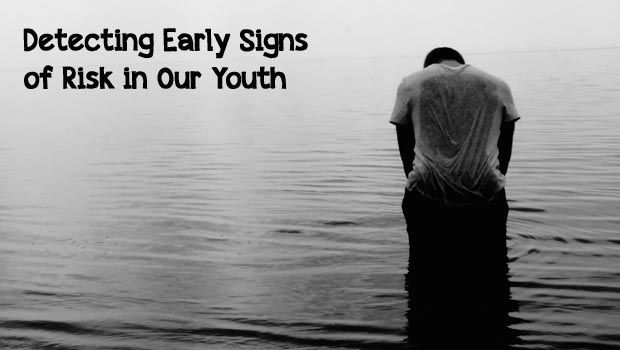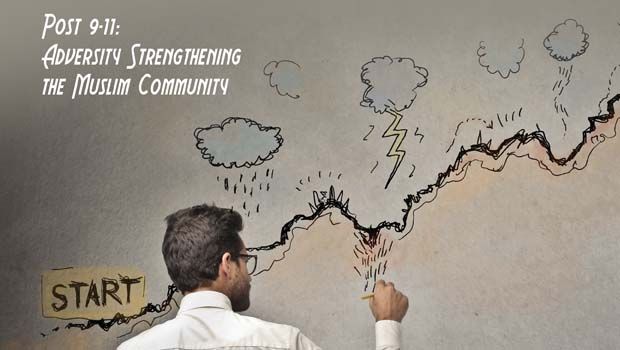Young children and teens today are bombarded from all around them via fellow peers, enticing ads, music, movies, and more, all calling them to engage in harmful behaviors. They are told to do whatever will make them “happy” or “fulfilled,” messages that turn them away from modesty, decency, common sense, and wisdom. It is essential that we, as community leaders, parents, educators, and medical and mental health professionals be aware of the constant struggle that is faced by today’s youth. We must not dismiss or deny signs of risky behavior, or believe that our youth are immune to such things as alcohol or drug use, or becoming sexually active.
My question to the parents is always “What prevented you from seeking help when you started noticing a change in your child’s behavior?”
We must also learn to recognize the warning signs and take action right away before things progressively become worse. In order to understand the struggle, we must first take a look at what could lead to psychological, spiritual, and/or social decline in our youth and what we can do to prevent that. Although these three categories are intertwined and influence one another, we will look at them separately to more deeply understand the impact of each.
Psychological
In her recent article, 12 Warning Signs Your Child May Have a Mental Health Issue, Dr. Susan Newman discusses “parent radar,” an essential tool all parents have that can help them discern if there is a psychological issue to be dealt with. The parent radar is the innate sense that something is not right with your child even though others may be telling you that it is a phase or a stage and the child will grow out of it. It is the feeling deep down that the mood swings, aggressive behavior, or overeating are not just part of growing up and learning how to cope with and navigate the complexities of life, but are a result of a deeper issue the child is dealing with. Trusting that feeling is essential because ignoring it could lead to dire consequences. When there is a feeling that something is just not right, it is time to seek help to rule out any mental health issues the child may be struggling with. Ignoring the feeling and hoping the issue will go away is where many parents go wrong. The issue will only increase in intensity and will become that much more difficult to resolve.
I often have parents come into my office with a child who is being disruptive or disrespectful to the parent, a child who is failing in school, a girl who is being aggressive with her siblings, or a boy who has become withdrawn and non-communicative with family members. When I ask how long this has been going on, they typically answer: a few months, over a year, or sometimes a few years. My question to the parents is always “What prevented you from seeking help when you started noticing a change in your child’s behavior?” The answer is not always the same, but most often it is: “We didn’t think it was a big deal” or “We thought it would go away on its own.”
It is essential to reach out for help when any warning signs present themselves. Ann Douglas, author of Parenting Through the Storm: Find Help, Hope, and Strength When Your Child Has Psychological Problems, discusses the warning signs to look out for. A few of these are frequent mood swings; display of intense emotions such as angry outbursts or extreme fear; difficulty sleeping or having nightmares; a lot of physical complaints. These are just a few of the many warning signs in children that may indicate that a psychological component is playing a part. It is important to be aware of the fact that any significant, extreme, or negative change in your child’s normal mood or behavior should be looked into. As parents, we must keep the communication open with our children, preteens, and teens so that we are able to discuss honestly and directly with them any concerns we may have with regard to their behavior. When children feel comfortable talking to their parents, they are more likely to turn to them for help.
Spiritual
Too often parents clash with their children or teens over religion, urging them to pray salah and read Quran, and wondering where they went wrong when their child refuses to comply or follow through. There is a common fear among Muslim parents that their children will go astray and completely denounce the deen or not wish to live a life of obedience to Allah’s commands. Parents spend many nights on the prayer rug earnestly seeking Allah’s help in guiding their children. Prayers are a huge step in the right direction, but so is patient, loving communication and interaction with our children. From a very young age, the parent is the role model when it comes to religion. They must be authoritative (not authoritarian), yet kind and fair. If religion is associated with any misbehavior or less than mature words and actions on the part of the parent(s), the child is likely going to feel alienated from Islam. Educating your child about the deen, demonstrating on a daily basis its values and principles, and imbuing it with meaning and purpose and joy through your love and encouragement – all this is essential, especially in the teen years.
Warning signs of spiritual decline include a lack of interest in going to the masjid, in reading the Quran, or in praying. These may seem obvious but what may not be as clear is the feeling underneath the lack of interest. What is occurring inside the child/teen that is leading to this distance from deen? This must be unearthed in order for the spiritual decline to be understood and addressed. I have often seen in my practice teens who have lost hope in Allah because of prayers being unanswered, or others who have committed sins that they do not believe they could be forgiven. Trust, hope, and belief in Allah’s mercy are essential discussions to engage youth in so that they can relate these valuable principles to their own situations. Again, communication is always key. A connection to your teen and awareness of what he/she is going through is necessary in order to be a mentor, a compelling influence, and a source of guidance and comfort to him or her.
Social
The social life of preteens and teens is so important to them. This stage of life is when they are discovering themselves and, therefore, depend very highly on their peers. We know it well that Prophet Muhammad (pbuh) has said: “Man is influenced by the faith of his friends. Therefore, be careful of whom you associate with.” This statement must be focused on in this stage of a person’s life because the early teen years are when strong friendships are being developed. As parents, we must be aware of the people who are spending time with our youth, and the influence they may have on them, for good or ill. If our children are showing any signs of disinterest in being around family, mistreating others, becoming non-communicative, isolating themselves, etc., we must take note and remedy the situation before it worsens.
Perhaps greater than the influence of friends is the influence of the Internet. Social media has grown so exponentially that many parents are unable to keep up with the different apps and social media outlets that the youth connect to and engage in on a daily basis, often multiple times a day. Inappropriate words, pictures, and videos can be shared in an instant, and access to them has become easier than ever before. Dr. Carolyn C. Ross, in her article, Overexposed and Under-Prepared: The Effects of Early Exposure to Sexual Content, notes the danger:
Research has long established that teens who watch movies or listen to music that glamorizes drinking, drug use or violence tend to engage in those behaviors themselves. A 2012 study shows that movies influence teens’ sexual attitudes and behaviors as well. The study, published in Psychological Science, found that the more teens were exposed to sexual content in movies, the earlier they started having sex and the likelier they were to have casual, unprotected sex.
It is simple common sense that there are detrimental effects on children from exposure to sexual and violent content. We as parents must strive to minimize such exposure via phones, tablets, and computers. Limits must be placed on when and where the device is used and for how long. There are numerous parental controls that are available on devices so that parents can control what their children are being exposed to. Some warning signs to look out for include: a decrease in time spent with family, an increase in time spent on devices, a decrease in communication/interaction with others, and any negative attitude or behavior change. Constant monitoring and open discussions with teens about sex, alcohol/drugs, and violence can prevent exposure and the more feared result, addiction. Children as young as nine years old are being exposed to pornography, and we simply cannot ignore this issue any longer; we must openly discuss in our homes and in our Islamic centers the danger to our children.
Prevention is Key
Unfortunately, parents so often seek professional help only when a situation with their child has reached crisis proportions. We as a community need to encourage one another to ask for help, to seek counseling, and to attend workshops so that we can work to prevent psychological, spiritual, and social problems in our youth. We must be proactive in creating resources within the community to protect the youth from harmful influences. The greatest need for children is connection and a sense of belonging. When they feel a lack of connection to their parents and to their community, that is when the need for something else comes into the picture. These feelings of loneliness and isolation drive teens to turn to drugs and sex, and also make them susceptible to depression, anxiety, and other mental health conditions.
Communication is essential among families, friends, and community members so that we can assist one another when a warning sign presents itself. Counseling should never be a last resort but, instead, must be a resource that we encourage one another to utilize in times of chronic or acute stress, or any alarming concern. This can prevent even larger problems from taking hold of our families and communities. It is time we moved forward, from burying our heads in the sand to facing the problems head and heart on.






